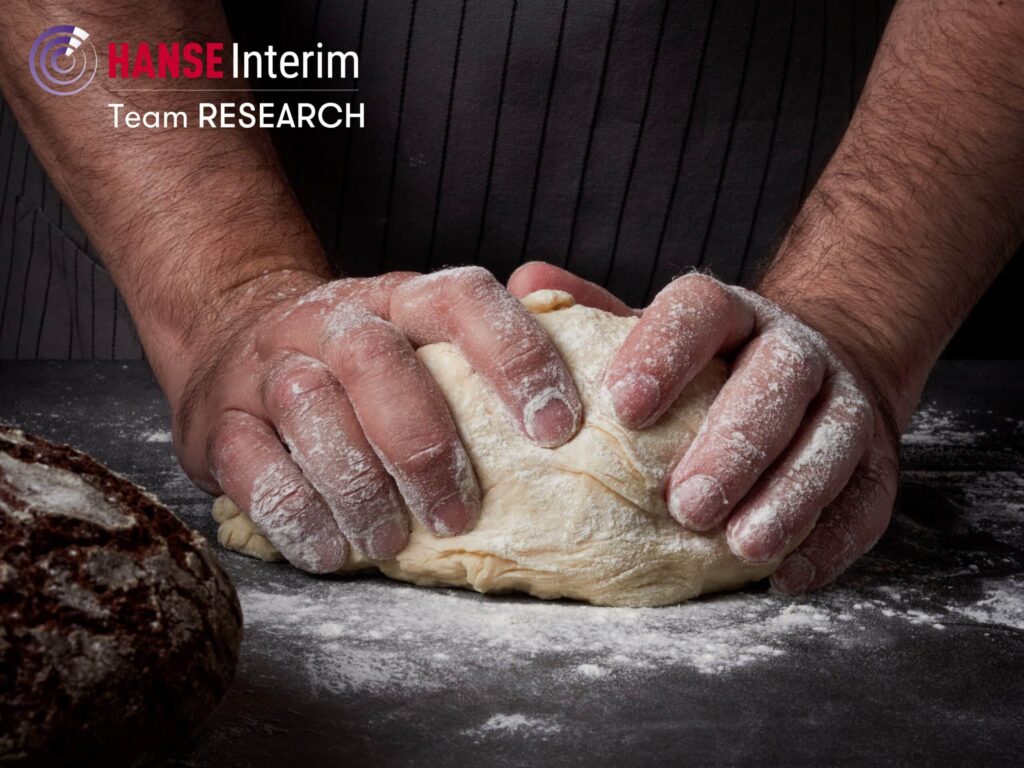HANSE Interim Team Research: Which developments are currently affecting baking traditions in Germany? Which challenges may be critical for future success?
Despite difficult economic conditions as a result of the Corona pandemic and the war in Ukraine, the bakery industry in Germany has been able to assert itself in recent years. However, the situation remains tense due to ongoing changes in the structure of the sector and permanent adaptation to changing dietary habits and trends. As part of a project of the HANSE Group for a client active in the bakery industry with 80 branches in Germany, HANSE Interim not only analysed the key market developments as well as the decisive trends but also their significance and impact on the future opportunities and risks in the baking industry.
Overview of bakery habits
Since 2018, the sector has recorded a slight decrease in the number of companies and establishments as well as a decline in sales volume of approximately 0. 3% per year.
In particular, contact restrictions and other infection protection measures had a negative impact on the volume of baked goods sold in 2020.
By repealing these measures, the behavioral consumption of consumers and business catering operations have largely returned to normal.
At the same time rising prices for raw materials, energy and the associated price increases for bakery products are having a strong dampening effect on demand.
Umsatzentwicklung im deutschen Bäckerhandwerk
(in Mrd. EUR)

Anzahl an Betrieben und Unternehmen im Bäckerhandwerk

At the same time rising prices for raw materials, energy and the associated price increases for bakery products are having a strong dampening effect on demand.
This development is further reinforced by the conflict in Ukraine, resulting in a shortage of grain and oilseeds on the world market. Future weather events may also increase the risk of crop losses enormously and drive wheat prices to a new, high level.
Increasing prices will continue to threaten, in particular the existence of small businesses which might disappear anyway.
Large firms therefore cover an increasing share of the bakery market, while smaller firms are more and more displaced, have to be closed or bought up.
Future development of baking traditions
Innovations and their application in companies will also be decisive for the future bakery development. New technologies could lead to greater product diversity, extended shelf life or reduced preservative content. However, the cost-benefit issue is in the foreground, too, especially for small bakeries that focus on premium products. However, personal costs are still caused by a large proportion of the industry’s costs in baking industry. Therefore, the future development of the statutory minimum wage will also have a significant impact in the future of baking. As the sector relies more on low-wage earners for cost reasons, the impact of raising the minimum wage is therefore particularly noticeable.
Snacking culture instead of having dinner
A general change in the lifestyle of Germans also lead to a decline in the turnover of small bakeries. In recent years, a snacking culture has developed in Germany, especially among the younger population, which increasingly renounces the traditional evening meal.
With the increasing awareness of health and the associated nutritional trends of the German population, the baking industry must therefore have the courage to deal with different market conditions. In particular, a growing demand for balanced and high-quality products exists with consumers still willing to pay a significantly higher price.
Nevertheless, bakeries still experience a tension between quality and quantity. Particularly during the coronavirus pandemic, consumers preferred the feel-good atmosphere in bakeries to self-service in supermarkets, as the fear of being infected with the virus was significantly lower. Future behavioural development also depends on a large extent on additional hygiene measures.
Summary
According to forecasts, the German baking traditions is expected to grow by about 0. 8% per year by 2027, despite the major challenges.
However, especially bakery shops and supermarkets with low prices for industrially manufactured bakery goods put the bakery industry under severe pressure. The current prevailing economic uncertainty as well as the persistently high inflation could encourage consumers to buy bakery products at discount prices. In addition, the bakery industry continues to suffer from unstable supply chains and high energy prices.
What developments do you see in this market in the future?
Yours faithfully
HANSE Interim Management
Andreas Lau


